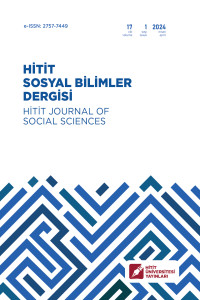Denetim Ücreti Üzerinde Etkili Olan Faktörler: Borsa İstanbul İmalat Sektöründe Bir Araştırma
Factors Affecting the Audit Fee: A Research in Borsa Istanbul Manufacturing Sector
Author(s): Işık ALTUNAL, Zafer Cemre ALTAYSubject(s): National Economy, Micro-Economics, Socio-Economic Research
Published by: Hitit Üniversitesi
Keywords: Independent Audit; Audit Quality; Audit Fee; Audit Effort;
Summary/Abstract: The aim of the study is to determine the factors affecting the audit fee. Audit fee is an element of audit quality indicators and represents the reward for the time and effort spent in the audit. Therefore, the audit fee was also considered as an indicator representing the audit effort and the problem of the study was determined. In the study, with the question "What are the factors underlying the audit effort?", 480 firm-years of 160 companies traded uninterruptedly in the BIST Manufacturing Sector for the 2020, 2021 and 2022 periods were examined and an independent audit fee was take into account to represent the audit effort. Thus, it is aimed to obtain information about the labor and effort spent on the items audited in the study. Since audit fees in our country have started to be announced as of 2021, little work has been done in the literature. Therefore, it is thought that the study will contribute to the literature. In the study, the natural logarithm of the independent audit fee was taken as the dependent variable, and proxy variables were determined for the independent variables in accordance with the literature. Accordingly, the independent variables created in the study are variables representing the client company size, company complexity, natural risk, profitability rates, financial failure variables, value increases and decreases and debt ratios. Since the 2020 data for independent audit fees was included comparatively in the 2021 financial statements, it could be included in the research. Data for 2023 couldn’t be obtained because it hadn’t yet been published at the time of the study. Panel data analysis was tried to be performed with data small horizontal cross-section and results were interpreted. The short time series constitutes the limitation of the study. Another limitation is that non-audited incomes isn’t included in the study. Looking at the descriptive statistics of the variables included in the study, it is seen that the Altman Z score is 6.88 in 2020, 6.38 in 2021 and 6.13 in 2022. Considering that the Altman Z score financial success criterion should be 2.99 and above, it is concluded that the businesses are financially successful. Another noteworthy issue is the export rate taken to represent the complexity of the company. While the export rate was 5.16 on average in 2020, it is seen to be 0.28 on average in 2021 and 2022. Therefore, it was concluded that there was a serious loss in the export rate during and after the pandemic, and companies turned more to the domestic market. Finally, it is seen that the average cash flows provided by operations are -0.02 in 2020. It is understood that companies in the manufacturing sector experienced cash insufficiency during the pandemic period. No unusual situation was found in other variables. After interpreting the descriptive statistical results in the study, unit and fixed effect assumptions for panel data analysis were examined and after applying deviation tests from the assumptions, it was concluded that the analysis that best suits the data of the study was the Driscoll - Kraay estimator. As a result of the panel data analysis using the DriscollKraay estimator, it was concluded that the auditor demands higher fees from companies with high return on assets, demands more audit fees from businesses with large total assets (balance sheet) and makes more audit efforts for these businesses. However, no significant relationship was found with the number of foreign partnerships (subsidiaries) and the total number of subsidiaries formed to represent the complexity of the company. It has been concluded that the factor that has the most impact on the audit fee is the status of being audited by the big four companies. Accordingly, it was concluded that while local audit firms received the lowest audit fee, the big4 audit firms received the highest audit fee. Another result of the study is that other comprehensive income items whose amount is determined more subjectively, have a negative impact on the audit fee. It was concluded that auditors did not make much effort on other comprehensive income items. The reason for this is thought to be that the audited companies benefit from expert valuation companies when accounting for items that represent unrealized income, such as gains from appreciation. It was envisaged that the auditors accepted that the totals recognized as a result of the valuation process carried out by expert audit companies was correct and therefore they did not make much effort in the audit.
Journal: Hitit Sosyal Bilimler Dergisi
- Issue Year: 17/2024
- Issue No: Sp. Issue
- Page Range: 111-127
- Page Count: 17
- Language: Turkish

